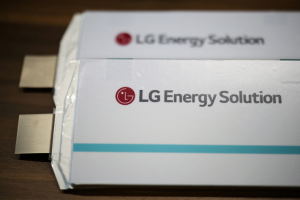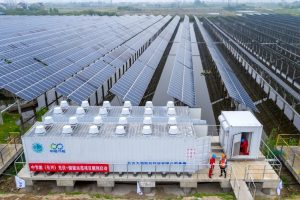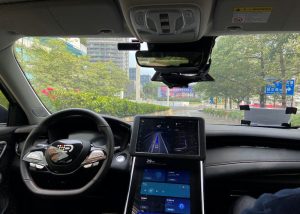The United States and the European Union are all but set to impose steep tariffs on imported Chinese electric vehicles.
The US government on Friday locked in higher tariffs on Chinese imports — including an eye-watering 100% levy on electric vehicles — which will come into effect by the end of the month.
That was a day after the European Commission rejected a last ditch effort by Chinese EV-makers to avoid the bloc’s planned tariffs by setting ‘minimum import prices’.
Also on AF: US House Passes Bill to Limit China’s Access to EV Tax Credits
The Commission said on Thursday that several Chinese EV exporters had submitted price undertakings — a commitment by an exporter to respect minimum import prices — to offset subsidies. But none of them “would eliminate the injurious effects of subsidies”, it said.
Both decisions come on the heels of repeated ‘warnings’ and appeals from China, asking Washington and Brussels to reverse course on the planned tariffs.
China’s Commerce Minister Wang Wentao is even heading to Europe next week to hold talks with the Commission’s Executive Vice President and Trade Commissioner Valdis Dombrovskis on the anti-subsidy case that led to the tariffs proposal.
Both the US and EU argue that Chinese state subsidies are funding the country’s EV firms, allowing them to make EVs far cheaper than their Western rivals and leading to industrial overcapacity. The onslaught of such cheap Chinese vehicles is distorting markets and posing an existential crisis to Western carmakers, Washington and Brussels have said.
China, meanwhile, claims that the excess capacity argument is ‘groundless’ and that its dominance of clean technologies like EVs is the result of innovation and an early investment in related supply chains. Beijing has also accused the US of implementing tariffs on China-made EVs — despite importing very few them — to drive international policy.
View this post on Instagram
US tariffs start September 27
Both the US and Europe have also faced some pushback at home against the planned tariffs.
During public consultations in the US, some automakers raised concerns about levies on batteries, graphite and critical minerals needed to make EVs, saying the additional price will be “ultimately paid… by virtually everyone who lives in the United States.”
Meanwhile, over in Europe, chiefs at carmakers like Stellantis and Polestar have argued that steep tariffs will only end up hurting European auto firms — many of whom have invested heavily to build production bases in China.
Some experts also fear that imposition of such tariffs will slow down the adoption of EVs in these countries. It is worth noting that many Chinese EVs will continue to be cheaper than their US and European counterparts despite the steep levies.
Nonetheless, the US Trade Representative’s office said on Friday its planned EV tariff hikes will come into force starting September 27.
Other tariffs including a 50% on duty solar cells and 25% on steel, aluminium, EV batteries and key minerals will also go into effect at the same time.
A 50% duty on Chinese semiconductors, which now include two new categories – polysilicon used in solar panels and silicon wafers – are due to start in 2025.
Final EU vote in October
Meanwhile, the European Commission’s final duties will be subject to a vote by the EU’s 27 members.
They will be implemented by the end of October unless a qualified majority of 15 EU members representing 65% of the EU population votes against the levies.
In July, the Commission held an advisory vote on the tariffs in which a dozen EU members voted in support, four voted against and 11 abstained. If the voting pattern holds, the planned tariffs will go into force — likely for a five-year period.
In the advisory-vote, France, Italy and Spain supported the tariffs, while Germany, Finland and Sweden abstained. German carmakers, which made a third of their sales last year in China, have consistently voiced disagreement with the planned tariffs.
In a surprising turn of events, however, Spanish Prime Minister Pedro Sanchez unexpectedly has said the EU should reconsider its position. “We don’t need another trade war,” Sanchez said during a visit to China this month.
The trade war fears follow China’s vow to retaliate against “bullying” tariff hikes. Beijing has already opened retaliatory ‘anti-dumping’ probes into imports of European brandy and pork.
Earlier this month, China also began an anti-dumping probe into imports of Canola seeds from Canada after Ottawa announced it would — like the US — impose 100% tariffs on incoming Chinese EVs.
- Vishakha Saxena, with Reuters
Also read:
EU Reduces New Tariffs on China-Made Teslas By More Than Half
Chinese Carmakers Call For 25% Retaliatory Tariffs on EU Cars
In U-Turn, Elon Musk Says US Tariffs on Chinese EVs ‘Not Good’
Stellantis CEO Calls China EV Tariffs a ‘Trap’. He May Be Right
China’s BYD Welcome to Open an EV Factory in France: Minister
European Farmers Fear Trade War With China Over EV Tariffs
EU Tariff Fallout: China Warns of WTO Suit, Tesla to Hike Prices
After Much Planning, China’s EV Makers Set to Storm Europe
As EU Eyes Tariffs, European States Chase China EV Factories
China EV Firms Scaling Back European Plans Over Subsidy Probe






















